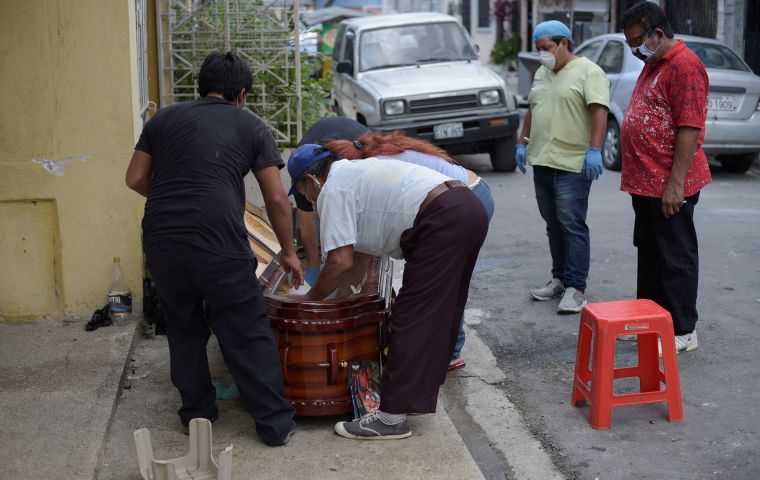MercoPress. South Atlantic News Agency
Desperate Ecuadoreans look for their loved ones in shipping containers filled with decomposing corpses
 Bodies were lost or misidentified, resulting in families looking for loved ones in morgues, hospitals and now, shipping containers, across the city.
Bodies were lost or misidentified, resulting in families looking for loved ones in morgues, hospitals and now, shipping containers, across the city. Guayaquil, Ecuador’s largest coastal city has been ravaged by coronavirus with bodies buried in mass graves or kept in newly-filled shipping containers to help relatives identify their loved ones among the decomposing corpses.
Guayaquil in March and April faced a brutal outbreak of the virus that left bodies piling up in overwhelmed hospitals and corpses sitting for days in houses before authorities came to retrieve them, as morgues overflowed.
The government established a task force to collect cadavers and deployed the containers to store the mounting bodies. But the chaos gave way to disorganization. Bodies were lost or misidentified, resulting in families looking for loved ones in morgues, hospitals and now, shipping containers, across the city.
Experts have so far identified 64 corpses through fingerprint recognition. They are also relying on family identification and more time-intensive genetic testing, according to Mario Corrales, the head of Ecuador’s Forensic Sciences Criminalistic Laboratory.
Interior Minister Maria Paula Romo told reporters that the government was working with a team of forensic doctors and scientists to identify the bodies “and to be able to give an answer to every last family that went through this unfortunate situation.”
“Every day progress is made on this issue, little by little,” she said.
Ecuador has officially reported over 37,000 coronavirus cases and more than 3,000 deaths, but authorities acknowledge both figures are likely significant underestimates due to a lack of testing.
Jorge Wated, the head of the task force responsible for collecting the deceased, said on Twitter on May 2 there were over 8,200 more deaths than would normally be projected in the province of Guayas, where Guayaquil is located, during April alone.
Ecuadorian President Lenin Moreno dissolved the task force in early May as the death toll stabilized.
The country’s attorney general has since launched an investigation into three public hospitals in Guayaquil over allegations that they did not follow protocol for identifying bodies, while the government has set up a website where people can search for deceased family members
If a patient was registered by authorities, the location of their remains is recorded on the site. But many Ecuadorians still have no answers.




Top Comments
Disclaimer & comment rulesCommenting for this story is now closed.
If you have a Facebook account, become a fan and comment on our Facebook Page!